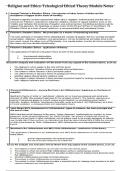Religion and Ethics: Teleological Ethical Theory Module Notes
, Unit A: Situation Ethics
Situation Ethics:
• Detailed by Joseph Fletcher in his 1966 work entitled, ‘Situation Ethics: The New Morality’, situation
ethics is a relativist, consequentialist, and teleological approach to ethics rooted in the concept of
agape, the ‘ruling norm’ of Christian decision-making.
• It is teleological because it views agape as the fundamental axiom upon which life is hinged, making it
our end, goal, and purpose, or ‘telos’ to pursue it.
• As a result of this, it is also consequentialist since Situation Ethics therefore aims to look for the most
loving outcome from all possible solutions when selecting a way to resolve an issue.
• In order to do so effectively, it is relativist in that it takes a subjective, personal outlook on moral
dilemmas to ensure that ethical decisions are made based on the individual aspects of the case.
• Bishop John A.T. Robinson, author of ‘Honest to God’, described the contents of Fletcher’s work as the
only ethic for ‘man come of age’.
• Fletcher, writing post-WW2, is said to have ‘tapped into powerful social and cultural undercurrents
that were becoming more and more evident.’
• The liberal 1960’s saw the introduction of the contraceptive pill; the rise in feminism and pacifist
movements (the latter in reference to the Vietnam War); and carefree, anti-authoritarian hippie
subcultures.
• Fletcher was inspired and preceded in thought by Durant Drake’s 1928 ‘The New Morality’ and Paul
Lehmann’s 1963 ‘Ethics in a Christian Context’ among others.
• His book thus added to the increasingly popular trend of situationism at a time where past religious
conformity in ethical matters was becoming especially undesirable.
Agape:
• Agape is profound, unconditional, and selfless love, unlike the romantic, familial, or materialistic
kinds of love it is distinguished from in classic Greek thinking.
• It is known as the ‘boss principle’ of Christianity, with its importance acknowledged from the Old
Testament.
• The Hebrew word ‘chesed’ was used to describe the relationship between God and his people,
translated as a steadfast and faithful love characterised by commitment and kindness.
• God’s omnibenevolence led him to free the Jewish people from slavery in Egypt in Exodus and, ‘God
so loved the world he gave his only son so that whoever believes in him will … have eternal life’.
• In the parable of The Good Samaritan, the word ‘aheb’ was used, which expresses a more impulsive
love, perhaps one instilled in us by the Holy Spirit as a result of God’s goodness.
• It is this universal, all-embracing, spontaneous love which inspired the notion of agape.
• ‘Agape’ is used in Leviticus to say, ‘love God and your neighbour as yourself’.
• It is self-sacrificing, pure, and unconditional; the kind of love epitomised in the life and character of
Jesus Christ as chronicled by Paul and the Gospel writers.
‘Love alone … has a built in moral compass.’ – Robinson
• According to Fletcher, love is the only intrinsic good, and acts as the fundamental axiom upon which
life is hinged.




